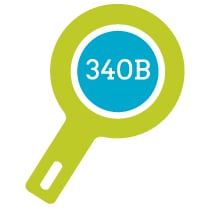 We previously noted that it is counterintuitive that more hospitals would become eligible for the 340B discount program as the share of uninsured patients these hospitals serve declines due to the coverage expansions in the Affordable Care Act.
We previously noted that it is counterintuitive that more hospitals would become eligible for the 340B discount program as the share of uninsured patients these hospitals serve declines due to the coverage expansions in the Affordable Care Act.
 Now, new data reported by hospitals shows the recent declines in the uninsured are translating into less uncompensated care for hospitals. If the number of uninsured is declining and uncompensated care is declining, why is the 340B program continuing to grow? This raises important questions about whether the current hospital eligibility criteria for 340B are consistent with the program’s origins as a discount program to safety net facilities.
Now, new data reported by hospitals shows the recent declines in the uninsured are translating into less uncompensated care for hospitals. If the number of uninsured is declining and uncompensated care is declining, why is the 340B program continuing to grow? This raises important questions about whether the current hospital eligibility criteria for 340B are consistent with the program’s origins as a discount program to safety net facilities.
The 340B program was designed to assist health care providers receiving federal grants and true safety net hospitals – those serving large numbers of uninsured or vulnerable patients – by making them eligible for deeply discounted pharmaceuticals to increase patient access to medicines.
Currently about 45 percent of all Medicare acute care hospitals in the U.S. participate in the 340B program. It is projected that as more individuals become eligible for Medicaid under the Affordable Care Act, more hospitals will become eligible for 340B because hospital eligibility is partly based on the number of Medicaid and low-income Medicare patients treated on an inpatient basis.
This new data raises questions about whether the growth in hospital eligibility for 340B is justified. Past research found that many 340B hospitals provide very minimal levels of charity care. In this new data, the American Hospital Association calculated all uncompensated care—including both charity care and bad debt—and still found that the uncompensated care burden declined by almost $4 billion from 2013 to 2014. This trend is likely to continue as the uninsured rate continues to decline.
If Congress does not address the 340B eligibility criteria for hospitals that qualify based in part on their share of Medicaid and low-income Medicare patients, more hospitals will likely continue to qualify for the program even as their uncompensated care burden drops. This raises concerns about the sustainability of the program and whether it is fulfilling Congress’s original intent.



 We previously
We previously  Now, new
Now, new 